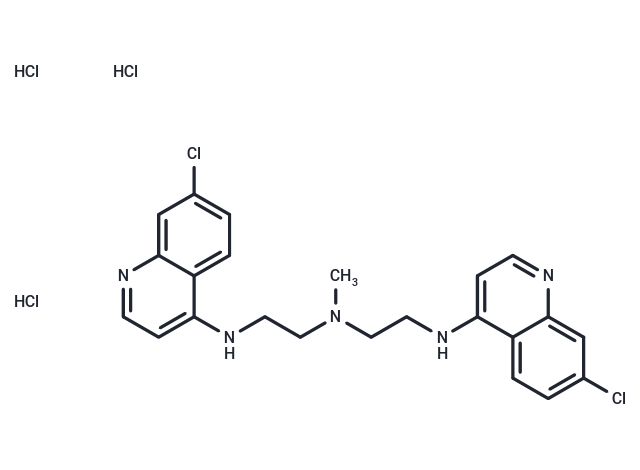Shopping Cart
- Remove All
 Your shopping cart is currently empty
Your shopping cart is currently empty

Lys05, or Lys01 trihydrochloride, is a potent, water soluble lysosomal autophagy inhibitor. Lys05 is a previously undescribed dimeric chloroquine which more potently accumulates in the lysosome and blocks autophagy compared with HCQ. Lys05 produced more potent antitumor activity as a single agent both in vitro and in vivo in multiple human cancer cell lines and xenograft models compared with HCQ. Lys05 is therefore a new lysosomal autophagy inhibitor that has potential to be developed further into a drug for cancer and other medical applications.

| Pack Size | Price | Availability | Quantity |
|---|---|---|---|
| 1 mg | $34 | In Stock | |
| 2 mg | $48 | In Stock | |
| 5 mg | $80 | In Stock | |
| 10 mg | $122 | In Stock | |
| 25 mg | $222 | In Stock | |
| 50 mg | $372 | In Stock | |
| 100 mg | $538 | In Stock | |
| 500 mg | $1,150 | In Stock |
| Description | Lys05, or Lys01 trihydrochloride, is a potent, water soluble lysosomal autophagy inhibitor. Lys05 is a previously undescribed dimeric chloroquine which more potently accumulates in the lysosome and blocks autophagy compared with HCQ. Lys05 produced more p |
| Targets&IC50 | HT29 cells:7.9 μM, LN229:6μM, 1205Lu:3.6μM, C8161 cells:3.8μM |
| In vitro | Lys01 is an autophagy inhibitor significantly (10-fold) more potent than hydroxychloroquine (HCQ). Its water-soluble derivative, Lys05, demonstrates enhanced potency by more effectively accumulating in and deacidifying lysosomes compared to HCQ. Both Lys01 and its trihydrochloride version induce similar dose-dependent effects, such as an increase in the LC3II/LC3I ratio, p62 protein accumulation, and identical half-maximal inhibitory concentrations (IC50) in the MTT assay[1]. |
| In vivo | In a study utilizing high-dose, short-term administration of lys01 trihydrochloride at 76 mg/kg intraperitoneally (i.p.), no mortality was observed in mice. However, symptoms such as arched backs and lethargy became apparent after two days of treatment. Electron microscopy (EM) revealed that in lys01 trihydrochloride-treated tumors, cells maintained intact nuclear and cytoplasmic membranes but demonstrated a significant presence of large autophagic vacuoles (AVs). This treatment markedly inhibited tumor growth, showing a substantial 53% decrease in the average daily tumor growth rate compared to tumors in vehicle-treated control mice. Furthermore, a pronounced increase in AV accumulation was noted in treated tumors—three-fold in HCQ-treated and six-fold in lys01 trihydrochloride-treated tumors—after 14 days of treatment, when compared to control-treated tumors. |
| Cell Research | 1205Lu, c8161, LN229 and HT-29 cells are treated with lys01 trihydrochloride (0, 0.01, 0.1, 1, and 10 μM) or Lys01 (0, 0.01, 0.1, 1, and 10 μM) in five replicates for 72 h. The Acid Phsophatase Assay kit is used for the MTT assay[1]. |
| Alias | Lys01 trihydrochloride |
| Molecular Weight | 549.75 |
| Formula | C23H26Cl5N5 |
| Cas No. | 1391426-24-6 |
| Smiles | Cl.Cl.Cl.CN(CCNc1ccnc2cc(Cl)ccc12)CCNc1ccnc2cc(Cl)ccc12 |
| Relative Density. | no data available |
| Storage | Powder: -20°C for 3 years | In solvent: -80°C for 1 year | Shipping with blue ice. | |||||||||||||||||||||||||
| Solubility Information | Ethanol: < 1 mg/mL (insoluble or slightly soluble) H2O: 3 mg/mL (5.46 mM), Sonication is recommended. DMSO: 5.5 mg/mL (10 mM), Sonication is recommended. | |||||||||||||||||||||||||
Solution Preparation Table | ||||||||||||||||||||||||||
H2O/DMSO
DMSO
| ||||||||||||||||||||||||||

Copyright © 2015-2025 TargetMol Chemicals Inc. All Rights Reserved.